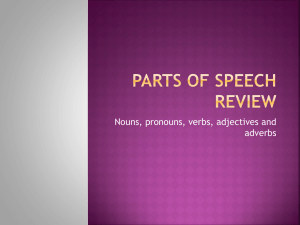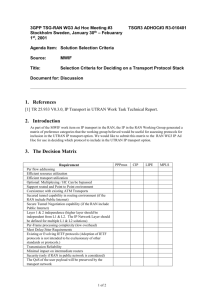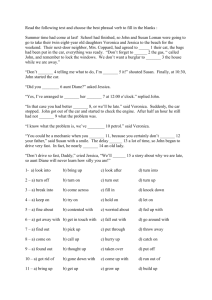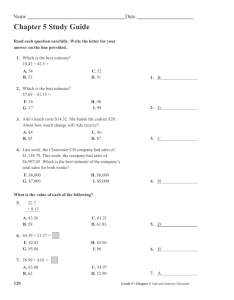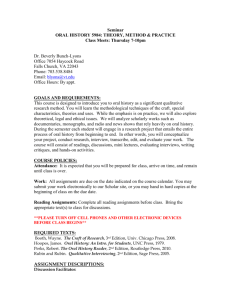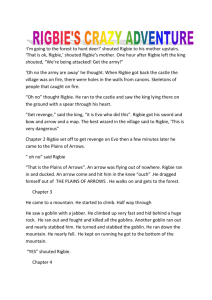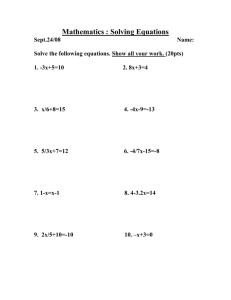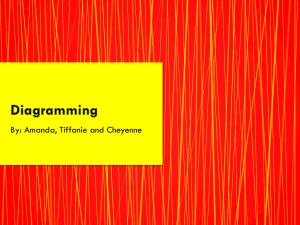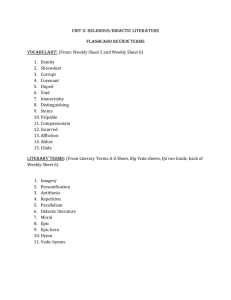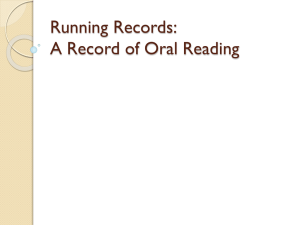Este TANDRA ha llegado desde la india.
advertisement
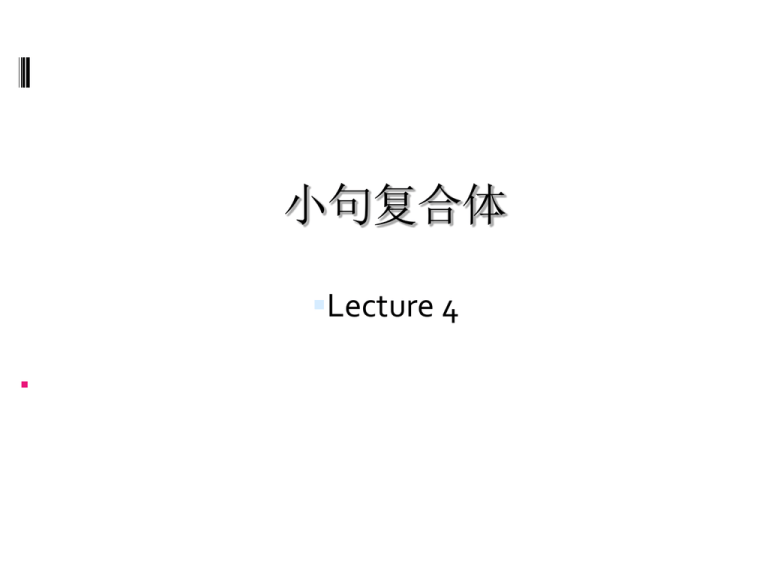
小句复合体 Lecture 4 小句复合体 小句:语法中的最高单位。它是及物性、语气 和主位等系统的起点,分别同时通过三个结构层 得到体现(及物性结构、语气结构和主位结构)。 小句体现了经验意义、人际意义和语篇意义, 在非标记(unmarked)的情况下也通过调群 (tone group)来体现。 小句复合体 小句复合体:主句+其他修饰小句 通过并列(parataxis)或主从(hypotaxis)关 系连接起来的小句组合,不包括嵌入小句。这种 组合是概念元功能中的逻辑功能。 Halliday( 1994: 216)指出,小句复合体的概念能 让我们完整地解释句子的功能组织。 并列:小句之间的逻辑依赖性,相互依赖的 小句同等重要。 相当于传统语法中的并列关系 如果两个小句通过并列关系连接起来,首句 称作起始句 (1), 第二句为持续句 (2). ||| I looked at the table || and there was nothing left. ||| 1 2 ||| Let’s face it, || the human body is like a condominium apartment. ||| 1 2 主从:相互依赖的小句之间处于不平等关系, 其中有一个主句,其他小句为修饰小句。 首要小句为主句 (a), 次要小句为从句 (b). 相当于传统语法中的从属关系( subordination), 但传统语法的从属关系对主从(hypotaxis)和嵌 入(embedding)不作区分。 嵌入小句即级阶转移的小句(rankshifted clauses)。 ||| Fear of flying is quite rational | because human beings cannot fly. ||| a b ||| Because human beings cannot fly, | fear of flying is quite b rational. ||| a 嵌入小句:级阶转移的小句 小句成为(名词)词组的一部分,即下移为成分 的一部分或者下移为小句成分 ||| I once had a leather jacket [[that got ruined in the rain]]. ||| 嵌入小句 1. 2. 3. 4. The students [[who have signed up for the course]] make the suggestion [[that we have a group discussion in class]]. You never see anybody on TV [[just sliding off the front of the sofa with potato chip crumbs all over their shirt]]. Just run as fast [[as you can]]. They’re very glad [[that they have won the first place]]. 1. [[Driving to the airport]] can make me nervous. 2. I gave her [[whatever I had there]]. 3. He likes [[to travel to exotic places]]. 扩展 第二小句对首句进行扩展 详述:elaborating (i.e.) = •换一种方式说,详细说明,评述,例举 1.Kings, emperors and pharaohs had storytellers; || that was their entertainment. (1^2) 2.I have a friend who’s unemployed || – he’s collecting unemployment insurance. (1^2) 3.They decided to cancel the show, | which upset everybody. (a^b) 4.They decided to cancel the show, | upsetting a lot of people. (a^b) John arrived earlier than Smith, | who broke her ankle yesterday. (a^b) One of the roughest was the TV quiz shows, | which gave him inferiority complexes. (a^b) My brother, who just won the first prize in writing, did not show up at last night’s party. (a < b> ) Extending (and, or) 添加新成分,给出例外,给出另一种选择 •添加 (positive, negative, adversative), variation (replacive, subtractive) 1. Maybe the comets killed the dinosaurs, || maybe they tripped and fell. (1^2) 2. It’s my book || but you can read it. (1^2) I could not cling to my past || nor did I wish to. (1^2) Enhancing (so, yet, then) •赋予首句表示时间、地点、原因、条件等环境特征 1.Arger was never able to produce it, || so I cut him off my payroll. (1^2) 2.We'll work for about an hour on Saturday, || then we'll work Monday and Tuesday of next week, || then taper off. (1^2^3) 3.I left the job | because I realized that I had done badly. (a^b) Projection “ ‘ 首句投射第二小句 转述言语或思想 被投射小句表示来自不同来源的命题和提议 言语过程:直接引述 1.She said || "I just work here". 1^2 言语过程:间接引述 She said | that she worked there. a^b Mental process (cognition): direct/indirect • They think, || “We can get up early tomorrow." 1^2 • They thought | that they could get up early the day after. a^b • I don’t want | to become a refugee for the rest of my life. (a^b) 心理过程 (perception) • We’ve heard | that John is a good swimmer. (a^b) 2. They saw | that the car had run away. (a^b) 嵌入投射 My question is [[if you can go faster, why don’t you go as fast as you can all the time]]? 2. It is easy to understand [[why steam goes up into the air]]. 3. [[That my brother likes stamp collecting]] is obvious to everyone in the neighborhood. 1. It is clear [[that they have left]]. That they have left is obvious. Projections – ideas vs. facts John thought || that class was over. (thought -- cognition -- projecting) 1. We all regretted [[that class was over]]. (regretted -- affection -- not projecting) 2. It strikes me || that there is no-one here. (mental process - cognition) 3. It worries me [[that there is no-one here]]. (mental process - affection) 1. She thought that the house needed restoration. 2. She saw that the house needed restoration. 小句作为成分 主位相等(Thematic equative ) What John did was to hep the lady with her luggage. 主位化评论(Thematized comment ) It’s nice to sit down with a quiet cup of tea. 强势主位(Predicated Theme ) It was John who won the first prize. paratactic Expansion elaboration extension John didn’t wait; John ran away, he ran away. which surprised everyone John ran away, and Fred stayed behind. enhancement John was scared, so he ran away. Projection locution idea hypotactic John ran away, whereas Fred stayed behind. John ran away because he was scared. John said: "I’m John said he was running away." running away. John thought to John thought he himself: "I’ll run would run away. away."
